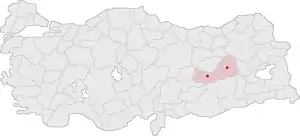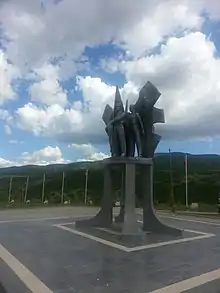Bingöl massacre
Bingöl massacre[4][5] was a Kurdistan Workers Party (PKK) massacre of unarmed Turkish military recruits on the Elazığ-Bingöl highway, 13 km west of Bingöl. 33 off-duty Turkish soldiers and five civilians were killed, thus breaking the first ever PKK cease-fire.[1][6][7]
| Bingöl massacre | |||||||
|---|---|---|---|---|---|---|---|
| Part of Kurdish–Turkish conflict | |||||||
 Locations of Elazığ and Bingöl Turkey | |||||||
| |||||||
| Belligerents | |||||||
|
|
| ||||||
| Commanders and leaders | |||||||
|
| |||||||
| Strength | |||||||
| 55 unarmed recruits[1][2] | 150 militants[3] | ||||||
| Casualties and losses | |||||||
|
33 recruits and 5 civilians[1] 22 recruits captured[2] | None[1] | ||||||
Background
In late 1991, Turkish President Turgut Özal attempted to establish dialogue with the PKK. He had said the idea of a federation could be discussed and a Kurdish language TV channel could be opened.[8] He also passed a bill, partially unbanning the use of the Kurdish language.[9] In response the PKK declared a cease-fire on March 20, 1993.[10] On April 17, 1993 Turgut Özal died under suspicious circumstances.[11] The Turkish army then attacked the PKK on 19 May, in Kulp.[12]
The attack
Turkish authorities claimed that PKK commander Şemdin Sakık had decided to respond to the attack on the PKK with a show of force, and had ordered PKK units to close down all main highways in Diyarbakir Province and surrounding regions on May 24. One of these roads was the Elazığ-Bingöl highway[13] which was allegedly manned by over 150 PKK militants,[3] who had come down from the mountains to the southeast.[1] The PKK stopped several buses transferring unarmed Turkish soldiers in civilian clothes, and then dragged[3] 33 soldiers and five civilians[1] (including four teachers)[13] from the vehicles and executed them.[3] Some 22 soldiers were spared by the PKK and taken prisoner, before being released.[2] The military was criticized for the fact that the soldiers were unarmed and there were no units protecting them.[8] Sakık, later captured by the Turkish security forces, testified during the Ergenekon trials that deep state elements in the Turkish military had sent the soldiers unarmed in the hope they would be killed, as part of the Doğu Çalışma Grubu's coup plans.[14]
Aftermath
On the 8 June 1993, Abdullah Öcalan announced the cease fire it declared in March was over.[15] The Turkish military intensified its anti-insurgency operations against the PKK during the following months.[1] A total of 92 Turkish security forces, 203 Kurdish rebels and 29 civilians were killed during anti-insurgency operations in May and June, an additional 120 Kurds were arrested during these operations.[2]
Turkish claimed that Kucuk Zeki, the PKK's commander in Muş at the time, described the attack as a turning point in the conflict, as the state stepped up its operations against the PKK and "the war got much worse".[13]
Legacy
On 24 May 2012, the 33 Martyrs Memorial near Bingöl was dedicated to the victims of the massacre.
References
- "Turkey - Atlapedia® Online". Retrieved 11 February 2015.
- Kurds in Turkey (page 11) Archived 2011-07-16 at the Wayback Machine
- "1993 Human Rights Report: TURKEY". Retrieved 11 February 2015.
- Cemal, Hasan (2010). Türkiye'nin asker sorunu: ey asker, siyasete karışma! (in Turkish). Doğan Kitap. ISBN 978-605-111-628-0.
- yazdı, Gülden AYDIN. "33 şehitli o günden beri hiç kahkaha atamadım". www.hurriyet.com.tr (in Turkish). Retrieved 2020-10-10.
- PKK has repeatedly asked for a ceasefire of peace since their establishment in the past 17 years Archived 2011-11-25 at the Wayback Machine
- "The European court of Human rights judgement" (PDF). ETCHR. Retrieved 1 February 2016.
- "TURKEY - History of PKK in Turkey". Retrieved 11 February 2015.
- Kurdish Language Policy in Turkey Archived 2012-07-27 at the Wayback Machine
- Phillips, David L. (2017-07-05). The Kurdish Spring: A New Map of the Middle East. Routledge. p. 60. ISBN 978-1-351-48037-6.
- "Remains of Turgut Özal reinterred - Turkey News". Hürriyet Daily News. Retrieved 2020-03-06.
- Gunes, Cengiz (2013-01-11). The Kurdish National Movement in Turkey: From Protest to Resistance. Routledge. p. 133. ISBN 978-1-136-58798-6.
- Page 214 Archived 2014-10-07 at the Wayback Machine
- "Secret witness reveals identity, shady ties between PKK and Ergenekon". web.archive.org. 2012-11-06. Retrieved 2020-12-02.
- Özcan, Ali Kemal (2006). Turkey's Kurds: A Theoretical Analysis of the PKK and Abdullah Ocalan. Routledge. p. 206. ISBN 9780415366878.
